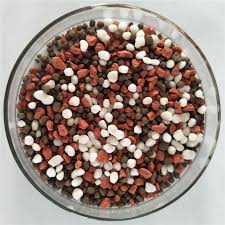
11월 . 09, 2024 14:40 Back to list
Potassium Humate Pellets Production Facility for Sustainable Agriculture Solutions
The Role of Potassium Humate Pellets in Agriculture A Focus on Manufacturing
Potassium humate pellets have gained significant attention in recent years as a potent organic amendment in agriculture. Derived from leonardite, a natural deposit of humic acids, these pellets offer numerous benefits, including improved soil health, enhanced nutrient uptake, and increased crop yields. As farmers and growers seek sustainable practices to enhance productivity, the demand for high-quality potassium humate pellets is on the rise, leading to the growth of specialized manufacturing facilities.
Understanding Potassium Humate
Before diving into the manufacturing aspects, it’s essential to understand what potassium humate is. It is a chemical compound formed from humic substances, which are produced through the decomposition of organic matter. As a rich source of potassium, it serves not only as a nutrient but also as a catalyst in various biochemical processes. When applied to soil, potassium humate helps to improve soil structure, enhance moisture retention, and promote beneficial microbial activity.
Benefits of Potassium Humate Pellets
1. Enhanced Nutrient Availability Potassium humate pellets facilitate the availability of essential nutrients in the soil. They enhance soil cation exchange capacity (CEC), promoting better absorption of nutrients by plant roots, which translates to healthier plants and higher yields.
2. Soil Structure Improvement The use of potassium humate aids in the aggregation of soil particles, which improves aeration and drainage. This is especially crucial in heavy clay soils, where poor drainage can be detrimental to root systems.
3. Environmental Sustainability As an organic product, potassium humate is environmentally friendly. Using it reduces the reliance on chemical fertilizers, leading to less runoff and decreased soil and water pollution. This aligns with the increasing trend of sustainable farming practices.
4. Stress Resistance Crops treated with potassium humate have shown increased resistance to environmental stressors such as drought and disease. This resilience is essential in today’s agricultural landscape, where climate variability is a growing concern.
potassium humate pellets factory

Manufacturing Potassium Humate Pellets
The production of potassium humate pellets involves several steps, ensuring that the final product meets the required quality standards.
1. Raw Material Sourcing The primary raw material for potassium humate production is leonardite. Reputable manufacturers source high-quality leonardite, which contains a high percentage of humic acids.
2. Extraction Process In this step, humic substances are extracted from leonardite using hot alkaline solutions. The extracted solution may undergo further purification to enhance the concentration of humic acids.
3. Potassium Addition To create potassium humate, potassium sources such as potassium hydroxide or potassium sulfate are added to the purified humic acid solution. This combination is crucial as it fortifies the product with potassium, ensuring its effectiveness as a fertilizer.
4. Pelletization The mixture undergoes a pelletization process, where it is formed into small, uniform pellets. This form is advantageous for handling and application, allowing for easy distribution and effective nutrient release.
5. Quality Control The final step is rigorous quality control. Pellets are tested for nutrient content, moisture levels, and physical properties to ensure consistency and efficacy. Quality assurance not only helps to meet regulatory standards but also builds trust with customers.
Conclusion
With the growing emphasis on sustainable agriculture, potassium humate pellets are emerging as a vital resource for farmers. Their ability to enhance soil health, promote nutrient uptake, and improve crop resilience positions them as a beneficial alternative to traditional fertilizers. As the global agricultural landscape evolves, the continued development of specialized factories for potassium humate production will play a crucial role in meeting the increasing demand for sustainable farming inputs. Through innovative manufacturing practices and a commitment to quality, producers can ensure that potassium humate pellets contribute to healthier soils and, ultimately, a more sustainable agricultural future.
-
Premium Amino Acid Fertilizer | Rapid Plant Growth Booster
NewsJul.31,2025
-
10 10 10 Fertilizer Organic—Balanced NPK for All Plants
NewsJul.30,2025
-
Premium 10 10 10 Fertilizer Organic for Balanced Plant Growth
NewsJul.29,2025
-
Premium 10 10 10 Fertilizer Organic for Balanced Plant Growth
NewsJul.29,2025
-
Premium 10 10 10 Fertilizer Organic for Balanced Plant Growth
NewsJul.29,2025
-
50 Pound Bags of 13-13-13 Fertilizer for All Plants – Bulk & Organic Options
NewsJul.28,2025
